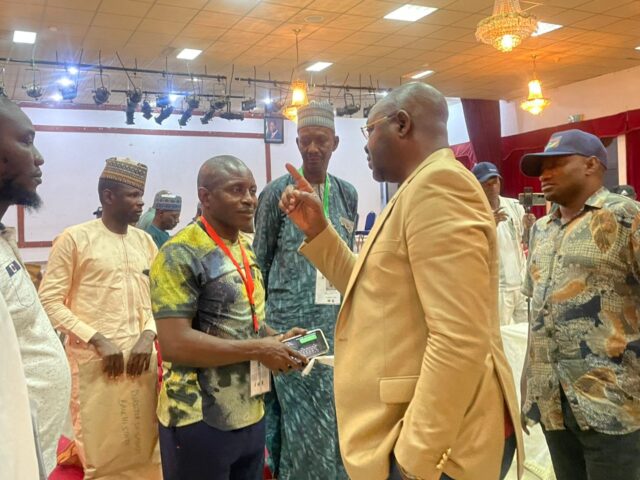On the sidelines of the on-going National Sports Festival (NSF) in Asaba, the Delta State capital, the Minister of Youth and Sports Development, Sunday Dare, Tuesday evening held a meeting with State Commissioners and Directors’ of Sports across the country to enunciate highlights of the recently approved National Sports Industry Policy (NSIP).
It will be recalled that the Federal Executive Council (FEC), in early November approved the new National Sports Industry Policy (NSIP) – the policy frame-work guiding the reclassification of sports from recreation to business.
The Minister outlined three main pillars of the NSIP to include the 3’I’s – Infrastructure, Investments and Incentives. He stated that the hitherto episodic funding of sports by government, tied to sporting events, as against the whole gamut of sports development will soon be a thing of the past as the NSIP implementation comes on stream.
“There are three triggers to this policy. If we are able to pull the triggers, you will see the monies coming. The first trigger is infrastructure. Without infrastructure, you cannot develop Sports. This is beyond brick and mortar. What you have in Delta, as big and as beautiful as those indoor sports halls are, without the athletes and equipment, which make up the sporting ecosystem, they are useless.
“The second trigger is Investment. If you don’t invest in a business, it will die. There is almost zero investment from the public, in our sports development. What comes from the government is not really an investment because sports is seen as a service, so there is zero return. Athletes, Federations seek for funds from government because they just see that in sports, there is nothing coming out of it. So we need to get investments, both public and private sector.
“The last one is the big one – Incentives. Every Industry needs incentives. There has been zero incentives for anyone to invest in sports. We presented a bouquet of Incentives to the Federal Executive Council(FEC). The final details will be worked out between the Ministry of Youth and Sports, Ministry of Finance, Federal Inland Revenue Service (FIRS) and the Central Bank of Nigeria.
“One of the Incentives proposed and approved for a prospective investor in sports is a single digit interest of 5% on loans from banks, as against the standard 21%,” the Minister highlighted.
Dare also outlined tax holidays and rebates for specified time periods as one of the Incentives for private investment in sports. He likened it to the tax credit scheme conceptualised by the Buhari administration for infrastructure development, whilst also asserting that State Governments will be encouraged to give land and relax the documentation process for prospective investors.
Another major component of the NSIP is the Independent Athletes Welfare Fund(IAWF), which, according to the Minister, will require the Federal Government providing the seed funds which will be managed by an independent committee that will set the criteria and modalities for disbursement to prospective, shortlisted athletes.
As part of the Federal Government’s plan to put the NSIP on a strong footing, Dare revealed that a one- time grant to fix about 12 major sports facilities across the six geo-political zones is in the works. He stated that when the renovation is completed, private sector players will be invited to manage the facilities for at least two years, in the first instance, with 20% of revenue generated paid to the Federal Government, through the Treasury Single Account (TSA).
“When we do this successfully, and sports start contributing revenue to the Federal Government, we can then make a case for a bigger budget for sports development,” the Minister enthused.
Dare reiterated that the era of Federations looking solely to government for funds is over as sports is now business, promising to lead the way in providing a blueprint that will assist States and sports Federations to generate the needed investment for sports development.









